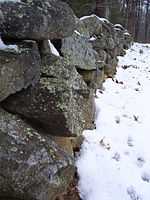"Mending Wall" is a metaphorical poem written in blank verse, published in 1914, by Robert Frost (1874–1963). There are five stressed syllables per line, with varying feet and occasional lines of iamb. The poem appeared as the first selection in Frost's second collection of poetry, North of Boston.
Text
- Something there is that doesn’t love a wall,
- That sends the frozen-ground-swell under it,
- And spills the upper boulders in the sun;
- And makes gaps even two can pass abreast.
- The work of hunters is another thing:
- I have come after them and made repair
- Where they have left not one stone on a stone,
- But they would have the rabbit out of hiding,
- To please the yelping dogs. The gaps I mean,
- No one has seen them made or heard them made,
- But at spring mending-time we find them there.
- I let my neighbor know beyond the hill;
- And on a day we meet to walk the line
- And set the wall between us once again.
- We keep the wall between us as we go.
- To each the boulders that have fallen to each.
- And some are loaves and some so nearly balls
- We have to use a spell to make them balance:
- "Stay where you are until our backs are turned!"
- We wear our fingers rough with handling them.
- Oh, just another kind of out-door game,
- One on a side. It comes to little more:
- There where it is we do not need the wall:
- He is all pine and I am apple orchard.
- My apple trees will never get across
- And eat the cones under his pines, I tell him.
- He only says, "Good fences make good neighbors."
- Spring is the mischief in me, and I wonder
- If I could put a notion in his head:
- "Why do they make good neighbors? Isn't it
- Where there are cows? But here there are no cows.
- Before I built a wall I’d ask to know
- What I was walling in or walling out,
- And to whom I was like to give offense.
- Something there is that doesn’t love a wall,
- "That wants it down." I could say "Elves" to him,
- But it's not elves exactly, and I'd rather
- He said it for himself. I see him there
- Bringing a stone grasped firmly by the top
- In each hand, like an old-stone savage armed.
- He moves in darkness as it seems to me,
- Not of woods only and the shade of trees.
- He will not go behind his father's saying,
- And he likes having thought of it so well
- He says again, "Good fences make good neighbors."
Summary
A stone wall separates the speaker’s property from his neighbour’s. The speaker muses at the beginning of the poem that there must be "something" that "doesn't love a wall" referring to the forces of nature that bring a wall to decay and require it to be repaired and rebuilt. In spring, the two neighbors meet to walk along the wall (each on his own side) and replace the rocks that had been displaced in the last year. The speaker sees no reason for the wall to be kept—there are no cows to be contained, just apple and pine trees. He does not believe in walls for the sake of walls. The neighbor resorts to an old adage: “Good fences make good neighbors,” a line listed by the Oxford Dictionary of Quotations as a mid 17th century proverb. The speaker remains unconvinced and mischievously presses the neighbor to look beyond the old-fashioned folly of such reasoning. He says, "Before I built a wall I'd ask to know / What I was walling in or walling out / And to whom I was like to give offense," noting that neither his apple trees nor his neighbor's pine trees are likely to encroach on the other's property. His neighbor will not be swayed. The speaker envisions his neighbor as a holdover from a justifiably outmoded era, a living example of a dark-age mentality. But the neighbor simply repeats the adage "Good fences make good neighbors."
References
External links
|
|---|
| | Poems | |
|---|
| | Poetry collections | |
|---|
| | Plays | |
|---|
|
